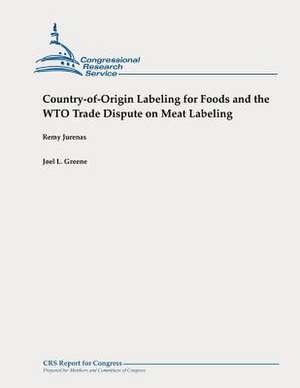Country-Of-Origin Labeling for Foods and the Wto Trade Dispute on Meat Labeling
Autor Remy Jurenas, Joel L. Greeneen Limba Engleză Paperback
Preț: 94.01 lei
Nou
Puncte Express: 141
Preț estimativ în valută:
17.99€ • 19.24$ • 14.100£
17.99€ • 19.24$ • 14.100£
Carte disponibilă
Livrare economică 27 martie-10 aprilie
Preluare comenzi: 021 569.72.76
Specificații
ISBN-13: 9781478355380
ISBN-10: 1478355387
Pagini: 38
Dimensiuni: 216 x 280 x 2 mm
Greutate: 0.11 kg
Editura: CREATESPACE
ISBN-10: 1478355387
Pagini: 38
Dimensiuni: 216 x 280 x 2 mm
Greutate: 0.11 kg
Editura: CREATESPACE
